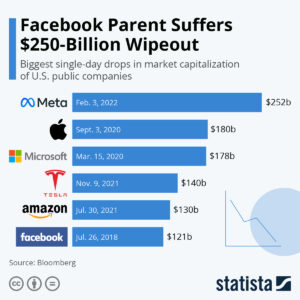

Facebook, suffers in e-comms sales!
Meta, developed e-commerce services in 2020 as people shopped more from home and the company faced a changing digital ad market.
Two years later, employees, former executives and retailers say the division remains a work in progress.
Many senior executives have already left in the past six months, according to a former senior executive in the division, while Facebook remains confident in its e-commerce business growth
Meta began its e-commerce during the early days of the pandemic, launching features called Facebook and Instagram Shops in May 2020.
The shops let brands post their catalogs directly on Facebook and Instagram. Some brands use the shops to direct users to purchase on their websites while others choose to sell the items to users via Meta’s services.
Meta also started bracing for the impact of privacy changes Apple Inc. announced in June 2020 for its iPhone and iPad devices.
Meta lost a staggering market value during 21/22
Meta’s Market value 21/22 chart by Statista


Those changes, which rolled out in April 2021, allowed users to opt out of having their activity on their devices tracked by companies like Meta. That tracking data was critical to how Meta measures the effectiveness of advertisements.
Since February,
Meta posted disappointing user growth and revenue and said Apple’s new policy would cost more than $10 billion in lost sales for 2022, the company’s shares have dropped more than 34%. (equivalent to a loss of $307.8 billion in market value) About 97% of Meta’s revenue comes from advertising.
According to its first-quarter results, Meta also said it would be spending more as the company pivots to the metaverse, a virtual world where people work, play and interact.
While, online shopping giants Amazon.com Inc., which dominates in e-commerce, reported $7.88 billion in ad sales in its most recent quarter, a 23% increase from the same period a year ago.








